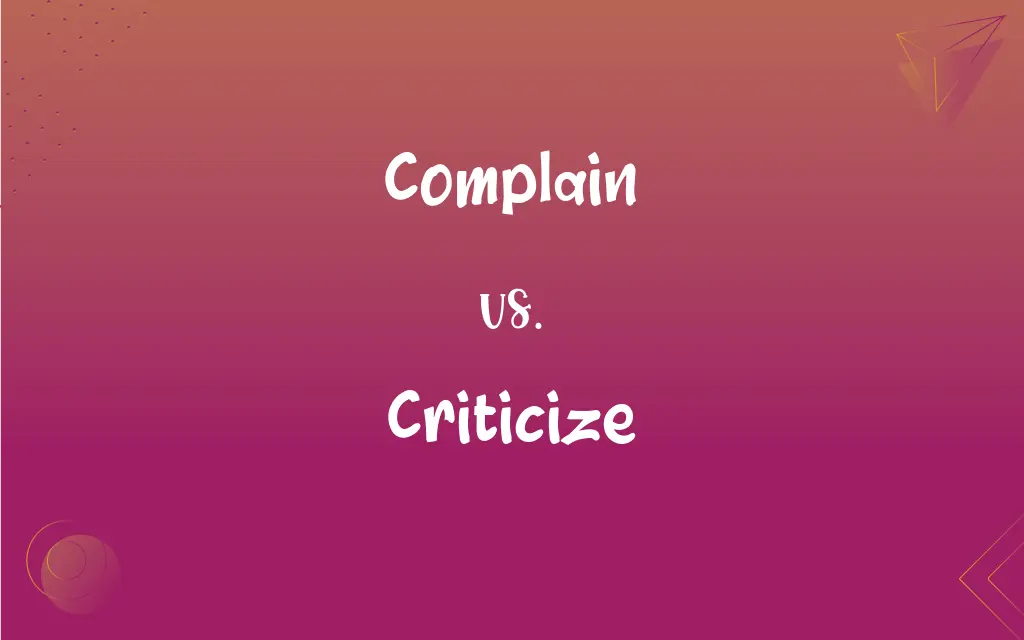Complain vs. Criticize: What's the Difference?
Edited by Aimie Carlson || By Janet White || Published on November 1, 2023
Complain involves expressing dissatisfaction or discomfort. Criticize entails pointing out faults or judging adversely.

Key Differences
Complain and Criticize, though used interchangeably in colloquial conversations, have nuances that distinguish them. Complain primarily pertains to expressing dissatisfaction, discomfort, or displeasure about a situation, person, or event. It often denotes a feeling of being wronged or discomforted. On the flip side, Criticize means to point out faults, inadequacies, or flaws, often stemming from a place of judgment or evaluation.
Diving deeper, when someone complains, they typically highlight a personal discomfort or grievance without necessarily suggesting a solution. For instance, one might complain about the weather being too hot, without providing an analytical judgment about it. Conversely, to criticize involves a level of analysis or judgment. It isn't just about expressing discomfort but pointing out what is wrong or could be better.
Moreover, it's vital to understand that complaining has a more subjective undertone. It's rooted in personal feelings or experiences. For example, "I always have to wait so long at this restaurant," is a complaint based on personal experience. Criticizing, however, leans more towards an objective or constructive viewpoint. For instance, saying, "The service at this restaurant is generally slow, they might benefit from hiring more staff," is a criticism.
In conclusion, while both Complain and Criticize revolve around expressing dissatisfaction, their nuances lie in the nature and intent behind the expression. Complaints are more personal and emotion-driven, while criticisms often aim to provide a constructive or analytical viewpoint.
Comparison Chart
Nature
Subjective and personal
Analytical and evaluative
ADVERTISEMENT
Purpose
Express dissatisfaction or discomfort
Point out faults or judge adversely
Outcome
Often seeks sympathy or acknowledgment
Aims for improvement or change
Undertone
Emotion-driven
Objective or constructive
Focus
Personal experience or discomfort
Flaws, inadequacies, or areas for improvement
Complain and Criticize Definitions
Complain
To lament or grumble about something.
Kids often complain when they are bored.
ADVERTISEMENT
Criticize
To point out the flaws or defects of.
She didn't hesitate to criticize the design for its complexity.
Complain
To make a formal accusation or charge.
He decided to complain to the manager about the rude service.
Criticize
To evaluate or judge as faulty or subpar.
Movie critics often criticize films they find lacking in content.
Complain
To voice one's grievances.
Residents complain about the noise from the construction site.
Criticize
To analyze and assess merits and faults.
It's easy to criticize without offering a solution.
Complain
To express dissatisfaction or annoyance.
She would always complain about the cold in the office.
Criticize
To comment negatively or disapprovingly about.
Parents should be careful not to overly criticize their children.
Complain
To make known one's unhappiness or discomfort.
He didn't complain once during the long hike, even though he was tired.
Criticize
To make judgments or evaluations, especially adverse ones.
As an editor, her job was to criticize the manuscript and offer improvements.
Complain
To express feelings of pain, dissatisfaction, or resentment.
Criticize
To find fault with
Criticized the decision as unrealistic. See Usage Note at critique.
Complain
To make a formal accusation or bring a formal charge; file a complaint.
Criticize
To judge the merits and faults of; analyze and evaluate
Criticizes art for a living.
Complain
(intransitive) To express feelings of pain, dissatisfaction, or resentment.
Joe was always complaining about the noise made by his neighbours.
Criticize
To act as a critic.
Complain
(intransitive) To make a formal accusation or bring a formal charge.
They've complained about me to the police again.
Criticize
To find fault (with something).
They criticized him for endangering people's lives.
Complain
To creak or squeak, as a timber or wheel.
The complaining bed-springs
Criticize
To evaluate (something), assessing its merits and faults.
Complain
To give utterance to expression of grief, pain, censure, regret. etc.; to lament; to murmur; to find fault; - commonly used with of. Also, to creak or squeak, as a timber or wheel.
O loss of sight, of thee I most complain!
Criticize
Same as criticise; as, The paper criticized the new movie.
Complain
To make a formal accusation; to make a charge.
Now, Master Shallow, you'll complain of me to the king?
Criticize
Find fault with; express criticism of; point out real or perceived flaws;
The paper criticized the new movie
Don't knock the food--it's free
Complain
To lament; to bewail.
They might the grievance inwardly complain.
By chaste Lucrece's soul that late complain'dHer wrongs to us.
Criticize
Act as a critic;
Those who criticize others often are not perfect, either
Complain
Express complaints, discontent, displeasure, or unhappiness;
My mother complains all day
She has a lot to kick about
Complain
Make a formal accusation; bring a formal charge;
The plaintiff's lawyer complained that he defendant had physically abused his client
FAQs
Is it possible to criticize without being mean?
Yes, offering objective and constructive feedback is a form of positive criticism.
Can criticism be constructive?
Absolutely. Constructive criticism is intended to help and improve.
Do Complain and Criticize mean the same thing?
No, Complain is about expressing dissatisfaction, while Criticize is about pointing out faults.
Is criticizing always bad?
No, when done constructively, it can lead to positive changes.
Is a complaint always personal?
Often, but not always. Complaints can be based on collective experiences too.
How can one complain effectively?
Being clear, specific, and objective helps in effective complaining.
Why is constructive criticism important?
It helps identify areas for improvement and promotes growth.
Is it negative to always complain?
Constant complaining can be perceived as negative or unconstructive.
What's the purpose of criticizing?
Criticizing aims to highlight faults for awareness or improvement.
Can you complain without offering a solution?
Yes, sometimes complaints are just expressions of feelings without suggested remedies.
Why do people complain?
Reasons vary: seeking empathy, venting frustrations, or wanting changes are a few.
Can businesses benefit from customer complaints?
Yes, complaints can offer valuable insights for improvement.
How is a grievance different from a complaint?
A grievance is a formal complaint, often related to perceived injustices.
What's the difference between critiquing and criticizing?
Critiquing is a detailed analysis, while criticizing can be a general negative assessment.
Can criticisms be biased?
Yes, criticisms can sometimes be influenced by personal biases or prejudices.
Is it okay to complain if I feel wronged?
Yes, expressing feelings and seeking redressal is valid when wronged.
How should one handle criticism?
Listen objectively, assess its validity, and use it for growth or improvement.
How can one reduce the urge to constantly complain?
Focusing on positives, practicing gratitude, and seeking solutions can help.
Should businesses fear complaints?
No, they should view them as opportunities for feedback and improvement.
Can criticism be based on personal preferences?
Yes, personal preferences can influence the nature of criticism.
About Author
Written by
Janet WhiteJanet White has been an esteemed writer and blogger for Difference Wiki. Holding a Master's degree in Science and Medical Journalism from the prestigious Boston University, she has consistently demonstrated her expertise and passion for her field. When she's not immersed in her work, Janet relishes her time exercising, delving into a good book, and cherishing moments with friends and family.
Edited by
Aimie CarlsonAimie Carlson, holding a master's degree in English literature, is a fervent English language enthusiast. She lends her writing talents to Difference Wiki, a prominent website that specializes in comparisons, offering readers insightful analyses that both captivate and inform.






































































